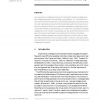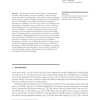1617 search results - page 191 / 324 » Knowledge Condition Games |
155
click to vote
JSW
2007
15 years 2 months ago
2007
—Becoming more competitive and more effective in the current scenes of Business and Public Administration, the organizations must be able to approach easily and quickly to the in...
107
click to vote
COGSCI
2004
15 years 2 months ago
2004
In order to understand ongoing activity, observers segment it into meaningful temporal parts. Segmentation can be based on bottom-up processing of distinctive sensory characterist...
130
click to vote
PRESENCE
1998
15 years 2 months ago
1998
Two experiments investigated components of participants’ spatial knowledge when they navigated large-scale ‘‘virtual buildings’’ using ‘‘desk-top’’ (i.e., nonimm...
124
click to vote
ALIFE
2010
15 years 1 months ago
2010
We present a model of social learning of both language and skills, while assuming—insofar as possible—strict autonomy, virtual embodiment, and situatedness. This model is built...
122
click to vote
ICRA
2010
IEEE
15 years 1 months ago
2010
IEEE
— In this paper, we consider the problem of how background knowledge about usual object arrangements can be utilized by a mobile robot to more efficiently find an object in an ...


